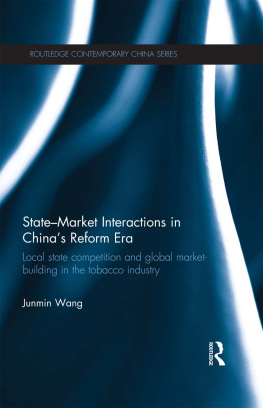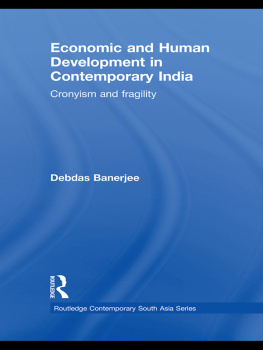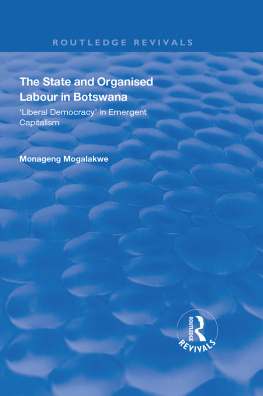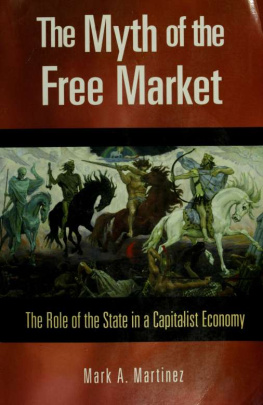
Dominant Classes and the State in Development
Westview Replica Editions
The concept of Westview Replica Editions is a response to the continuing crisis in academic and informational publishing. Library budgets for books have been severely curtailed. Ever larger portions of general library budgets are being diverted from the purchase of books and used for data banks, computers, micromedia, and other methods of information retrieval. Interlibrary loan structures further reduce the edition sizes required to satisfy the needs of the scholarly community. Economic pressures on the university presses and the few private scholarly publishing companies have severely limited the capacity of the industry to properly serve the academic and research communities. As a result, many manuscripts dealing with important subjects, often representing the highest level of scholarship, are no longer economically viable publishing projects--or, if accepted for publication, are typically subject to lead times ranging from one to three years.
Westview Replica Editions are our practical solution to the problem. We accept a manuscript in camera-ready form, typed according to our specifications, and move it immediately into the production process. As always, the selection criteria include the importance of the subject, the work's contribution to scholarship, and its insight, originality of thought, and excellence of exposition. The responsibility for editing and proofreading lies with the author or sponsoring institution. We prepare chapter headings and display pages, file for copyright, and obtain Library of Congress Cataloging in Publication Data. A detailed manual contains simple instructions for preparing the final typescript, and our editorial staff is always available to answer questions.
The end result Is a book printed on acid-free paper and bound in sturdy library-quality soft covers. We manufacture these books ourselves using equipment that does not require a lengthy make-ready process and that allows us to publish first editions of 300 to 600 copies and to reprint even smaller quantities as needed. Thus, we can produce Replica Editions quickly and can keep even very specialized bocks in print as long as there is a demand for them.
About the Book and Author
Why does capitalist development give rise to political alliances between the state and certain economically dominant classes? Addressing this question, Professor Banerjee uses an evolutionary approach to social structure to develop a theory of the interaction within and among business and manufacturing firms--a theory that highlights those aspects of market processes that promote the formation of dominant economic classes. Structural-evolutionary conceptions of property relations and of state planning and regulation are developed and combined with the market model.
According to Professor Banerjee, the market, property relations, and state administration form a self-sustaining structure that simultaneously develops the economy in an uneven and clustered fashion and gives rise to a "dominant alliance" between a segment of the state and the fastest-accumulating classes in the economy. He applies his model to India during the 1956-1975 period, examining the industrialization process of the Second and Third plans, the crisis of the mid-1960s, and the Green Revolution.
Sanjoy Banerjee is assistant professor of political science at Baruch College, City University of New York.
TO MY PARENTS
Dominant Classes and the State in Development
Theory and the Case of India
Sanjoy Banerjee
First published 1984 by Westview Press, Inc.
Published 2018 by Routledge
52 Vanderbilt Avenue, New York, NY 10017
2 Park Square, Milton Park, Abingdon, Oxon OX14 4RN
Routledge is an imprint of the Taylor & Francis Group, an informa business
Copyright 1984 Taylor & Francis
All rights reserved. No part of this book may be reprinted or reproduced or utilised in any form or by any electronic, mechanical, or other means, now known or hereafter invented, including photocopying and recording, or in any information storage or retrieval system, without permission in writing from the publishers.
Notice:
Product or corporate names may be trademarks or registered trademarks, and are used only for identification and explanation without intent to infringe.
Library of Congress Cataloging in Publication Data
Banerjee, Sanjoy.
Dominant classes and the state in development.
(A Westview replica edition)
Includes bibliographical references.
1. India--Economic policy--1947- . 2. Business and politics--India. 3. Elite (Social sciences)--India. 4. Economic development. 5. Business and politics. 6. Elite (Social sciences) I. Title. II. Series
HC435.2.B335 1984 338.954 84-19586
ISBN 13: 978-0-367-01990-7 (hbk)
This book has grown out of my doctoral dissertation at Yale University. I owe a debt of gratitude to my advisor Joseph LaPalombara, and to the other members of my committee, Charles Lindblom and Louis Wolf Goodman. I had some very fruitful discussions with David Apter during the course of my work. I must also thank Larry Adams and Donna Brown for helping to edit the. manuscript
Chapter One
Introduction
Capitalist development generates inequalities. Some classes, some communities, some sectors prosper far more than others, and many people benefit little or are actually immiserated in the course. Capitalism is a competitive process, so it is not surprising that there are winners and losers. But in every capitalist developing country, the rules of the game are always changing, sometimes fundamentally. And who wins depends on what the rules are. If today's winners can influence tomorrow's rules, they are likely to remain winners tomorrow, and for as long as they can continue the cycle of economic success and political power. This essay constructs, and tests for the case of postindependence India, a structural and evolutionary theory of the dominant alliance; an alliance between an economically dominant group and a state where the business strategies of the former and the development strategy of the latter are fitted to one another.
In the recent political science and political sociology literature there have been several works positing the existence of alliances between the state and economically dominant groups in the histories of capitalist and precapitalist states. In the works of Fernando Henrique Cardoso and Enzo Faletto, Theda Skocpol, Nicos Pouiantzas, and Charles Lindbiom, the theme of the alliance between the state and an economically dominant group is central. Each of these writers uses the concept of that alliance in different and important contexts. They have made a major contribution to the understanding of political economy, challenging both marxist and liberal orthodoxy.
For Cardoso and Faletto, the "pact of domination" is the key to understanding the history of Latin American dependency within the world capitalist system. Cardoso has held that the concept of the pact of domination is crucial for understanding the state. He writes
The conceptualization of the state is a complex matter but there does exist a certain degree of agreement that at the highest level of abstraction the notion of the state refers to the basic alliance, the basic 'pact of domination,' that exists among social classes or fractions of dominant classes and the norms which guarantee their dominance over the subordinant strata. When Marx and Engels referred to the state as the 'committee for the management of the common interests of the whole bourgeoisie,' they characterized it at this level of abstraction: the capitalist state is the "expression" of the capitalist mode of class domination. To avoid metaphysics, this 'expression' ought to be conceived of in organizational terms; that is to say, the dominant classes must make a continuing effort to articulate their diverse and occasionally contradictory objectives through state agencies and bureaucracies.









